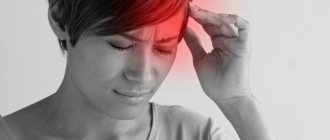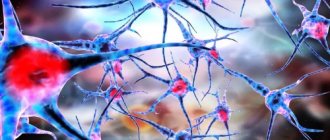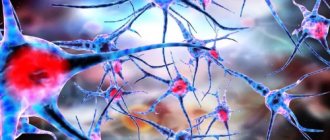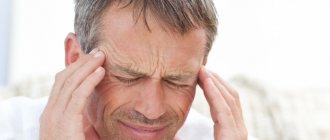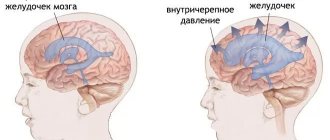Back in the second half of the 19th century, Dr. Edward Living, the author of a classic work on migraine, expressed the opinion that a headache attack can best be stopped by falling asleep. But what if sleep is the cause of poor health?
Sleep disorders are often accompanied by headaches. Therefore, it can be difficult to determine which of these conditions is the cause and which the effect. But in the case of obstructive apnea, it is the poor quality of night's rest that provokes headaches. Moreover, most often the malaise occurs in the morning, in the first hours after waking up, and then the patient’s condition gradually normalizes.
Causes of pathology
Serious pathologies that provoke headaches are diagnosed in quite rare cases. Most often, the cause of unpleasant sensations is a violation of lifestyle. By restoring your daily routine, you can completely get rid of headaches, notes Diana Shestopalova, a neurologist at polyclinic No. 5 of the Khimki Regional Hospital .
The primary causes of headaches in the morning after sleep, says Diana Shestopalova, include:
- A pose adopted for a long time in a dream. A person does not control his position, therefore, by accident or under the influence of external factors, he can take a non-physiological position. Some of the vessels passing through the neck to the brain will be blocked, which will lead to oxygen starvation of neurons with the appearance of pain in the head and neck upon awakening.
- Lack of fresh air flow. Our body vitally needs oxygen. Therefore, after sleeping in a room that is not ventilated, we feel even more tired. In the autumn-winter period, when it is cold to sleep with the window slightly open, it is better to allow fresh air into the room 1.5 - 2 hours before going to bed.
- Question answer
How are sleep and cholesterol levels related to human blood? Lack of sleep. Night sleep should last at least 7–8 hours. Only in this case the body is able to completely rest. Prolonged lack of sleep leads to the launch of emergency mechanisms. There is an increase in heart rate and blood pressure may rise. Insomnia, alternating night and day shifts, and time zone changes lead to overwork. Persistent headache appears in the morning. It is important to give your body proper rest before starting to take headache medications.
- Excessive rest is as harmful as its lack. Each person has his own biological rhythms that are comfortable for the body. They are violated by lack of sleep or, conversely, by spending too much time in bed. If a person rests for more than 9 hours, then the amount of serotonin in his body sharply decreases. Namely, it is considered the hormone of happiness. A decrease in serotonin leads to poor blood circulation in the brain, as well as a drop in blood sugar levels, which causes a feeling of fatigue, sleepiness, and headaches.
- Uncomfortable bed or poor sleeping position. The bed should be fairly hard and level, and the pillow should be positioned strictly under the head, without creating an unnatural position for the neck. In addition, doctors do not recommend sleeping on your stomach or side - the position on your back is the most physiologically correct for night rest.
- Bad habits. Even a small amount of alcohol has a toxic and dehydrating effect on the body, and in smokers, the blood vessels of the brain are always in a state of spasm.
- Dehydration. Drinking enough clean water helps the kidneys remove toxins from the body and is a good prevention of headaches.
- Stress, physical fatigue and psycho-emotional overload often act as a trigger for headaches.
- Sleep disorders - snoring, involuntary movements, nightmares, insomnia. All this leads to multiple awakenings during the night and affects the quality of sleep and rest.
All about migraines. Why does this headache appear and how is it treated? More details
However, among the reasons for waking up with a pain in the head there may be more serious ones that pose a health hazard, says the neurologist. “It is almost impossible to cope with them on your own. Therefore, it is better not to hesitate, indirectly contributing to the progression of the pathology, but to immediately contact competent doctors,” warns Diana Shestopalova.
Diseases and conditions that can cause morning headaches:
- Obstructive sleep apnea is a dangerous disorder that causes breathing to stop for more than 10 seconds. The disease is associated with a blockage of the oropharynx, as a result of which air cannot move through the respiratory tract. Pathology often occurs in people with certain anatomical features: a voluminous base of the tongue or palatine tonsils, a retracted lower jaw, a short and wide neck. Also at risk are people with obesity, thyroid dysfunction, diabetes and cardiovascular diseases. If the cause of morning sickness is apnea, then you need to consult a doctor. He will help you choose a special device to use during night sleep. This device will maintain constant pressure within normal limits.
- Bruxism is a pathology in which a person grinds his teeth, clenches them tightly, causing a characteristic grinding sound. According to statistics, the phenomenon occurs in 20% of the world's population. And among people who suffer from morning headaches, the phenomenon is observed in 45%. Why does bruxism cause headaches in the morning? Because pathology causes a number of changes, such as sleep disturbances, sudden awakenings, pain in the jaw muscles, the risk of apnea, dull pain in the temple area.
- Question answer
Is it true that interrupted sleep is harmful? Depression. In the body of a person who is in a depressed state, a low level of “happiness hormones” is detected. Such patients often experience sleep problems. Insomnia may develop. Or constantly alternate between lack of sleep and oversleep. All these factors lead to regular headaches. This requires qualified assistance from an experienced specialist.
- Hypertension is a chronic increase in blood pressure. The disease is diagnosed if the systolic pressure is 140 mm. rt. Art. and higher, diastolic - more than 90 mm. rt. Art. The condition can be caused by heart disease, dysregulation of vascular tone, and slower removal of excess fluid from the body. Elderly people, patients with obesity and endocrine pathologies are at risk. Hypertension can also be triggered by long-term use of hormonal drugs. If you have hypertension, it is important to monitor your blood pressure using a tonometer. The condition is dangerous because it causes stretching and weakening of arterial walls and can cause stroke and heart attack.
- Infectious diseases. A common reason why you have a headache in the morning after sleep is respiratory viral diseases. They are manifested by a sore throat, cough, rhinitis, and complications such as conjunctivitis, bronchitis and pneumonia are possible. However, in the initial stages, the only symptom may be a morning headache. Other symptoms develop over several days.
- Imbalance of hormones in the body.
- Hematoma after head injury.
- Arteritis, inflammation of the temporal arteries.
- Diabetes.
- Glaucoma.
- Chronic sinusitis.
- Food poisoning.
- Allergic reactions.
- Tumors (including malignant) of the brain or adrenal glands.
- Meningitis.
Problems on the head. What leads to migraine and how not to confuse it with a stroke Read more
Daytime sleep and weight loss
Research has shown that poor sleep is associated with weight gain and a higher likelihood of obesity in both adults and children. Due to lack of sleep, a person begins to experience hormonal imbalances and carbohydrates cease to be absorbed. Therefore, daytime sleep for weight loss can compensate for the lack of sleep at night and prevent these consequences, and daytime sleep can also contribute to proper metabolism.
Does napping affect weight? It lowers cortisol levels, which is responsible for the accumulation of subcutaneous fat, and also makes you more energetic when you wake up. The Harvard Medical School study also found that people typically burn 10 percent more calories when they sleep during the day.
How many calories are burned during a nap? The amount of energy expended by the body during daytime sleep when losing weight depends on many factors: the duration of sleep, its phases, the person’s weight and metabolic rate. On average, a person weighing about 58-60 kg burns about 38 calories per hour of sleep.
Types of morning headaches
This symptom is the body’s reaction to irritation of receptors, and therefore occurs with any violation, warns Diana Shestopalova. Receptors are located in the skin, muscles and soft tissues, meninges, as well as on the inner wall of blood vessels. Depending on the type and mechanism of development, several types of headaches after sleep can be distinguished.
- Vascular headache - this type includes cerebral atriovenous dystonia. One of the mechanisms for the development of pain is stretching of the vascular walls due to increased blood pressure and a decrease in their tone. Pain can also occur when there is a sharp spasm of blood vessels or when there is a violation of the outflow of fluid and its accumulation in the venous bed.
- Tension headaches are caused by muscle spasms in the neck and head. They compress nerves and blood vessels, blocking blood access to the brain. This type of pain can be associated with intense physical or mental stress, stress, and nervous tension. It is also caused by chronic diseases of the cervical spine, intoxication and other factors.
- Neuralgic - associated with inflammation or compression of the trigeminal nerve. The pain is acute, throbbing, and often worsens after sleep or prolonged periods without movement. Neuralgia is characterized by increased symptoms in a certain position, during pressure on the damaged nerve.
- Liquorodynamic - the cause of headaches in the morning is a deterioration in the drainage of fluid from the brain. As a result, intracranial pressure increases, which leads not only to constant pain, but also to nervous disorders, problems with hearing and vision, and slow development in children.
- Headache of a psychogenic nature - occurs during stress, sleep disturbances, and nervous tension. During the examination, no pathologies are detected, and the pain is caused by increased activity of the nervous system.
How to distinguish an ordinary headache from dangerous conditions? More details
“Most people have mixed headaches. When diagnosing one problem, several violations are detected simultaneously, which complement each other. It is important to determine which of them is the main one and begin treatment,” explains the neurologist.
Daytime naps for older people
According to research by American scientists, a short (20-30 minute) nap during the day can be beneficial for older people: improve memory, concentration, well-being and mood, as well as get rid of accumulated fatigue during the first half of the day. However, too much napping during the day (more than an hour) in older people has certain adverse health consequences. Researchers have linked it to an increased risk of diabetes, heart disease, and depression. This may be because long naps in adults are a sign of poor quality sleep at night. And insomnia is fraught with the following consequences for the body: disturbances in the nervous system, brain function, and increased heart rate.
Examination methods
Diagnosis of headaches is carried out using complex techniques, tests and equipment. A simple examination is not enough to determine the cause of morning discomfort and poor health.
The doctor may prescribe a set of examinations, which include:
- blood tests are a way to determine viral and bacterial infections, hormonal disorders, poisoning, vitamin imbalances and other diseases;
- Ultrasound, cardiography - methods of examining the heart to identify defects, disturbances of heart rhythm and conduction, congenital and acquired structural anomalies;
- Dopplerography - ultrasound diagnostics of blood vessels using a contrast agent, prescribed if insufficient blood supply to the brain is suspected;
- MRI of the head and neck is an informative diagnostic method for identifying neoplasms, acute and chronic diseases, and examining the cervical spine.
Why does a child have a problem?
The head can bother children regardless of age - it’s not always possible to simply explain it and complain. The main reason is a disruption in the blood supply to the brain. Other reasons:
- imperfection of the child’s autonomic system;
- the onset of a cold;
- kidney problems, endocrine disruption, anemia, rheumatic diseases;
- tooth pain;
- head injury.
Nervous strain due to stress, prolonged work, conflict, serious anxiety. Environmental effects: long stay in an unventilated place, excessive exposure to ultraviolet radiation, long exposure to sunlight.
- Pain in the back of the head. When a child complains of pain in the crown and back of the head, tension is often the cause. Occurs when the neck muscles are overstrained.
- It hurts in my temples. Pain in the temples indicates a disorder of the autonomic system.
- The forehead and top of the head hurt. Occurs before lunch due to increased pressure inside the skull.
- Half of my head hurts. This is how a migraine manifests itself. Unfortunately, the disease can affect young children. It is sharp, appears suddenly, does not depend on the time of day, and worsens within 10-15 minutes. becomes barely bearable.
The location of pain varies
All children have headaches from time to time. About 12% of students do not attend school once a month due to pain in the head. Mild pain appears a couple of times a week - there is no reason to worry. Having reduced the load on the child’s psycho-emotional state, you need to observe the body’s reaction.
If the pain decreases, then the reason is fatigue. The pain may not depend on physical fatigue; it occurs only against the background of emotional overload. The child does not have physical fatigue, but there is mental fatigue from worries, which exhausts him. In this case, the child’s head suffers.
Which doctor should I contact?
After examining the child, the doctor will write a referral to a specialist:
- See a pediatrician if, with pain, your body temperature rises, urination becomes difficult, a rash appears, and cold symptoms occur.
- See an otolaryngologist to rule out chronic problems and inflammation of the maxillary sinuses. A deviated nasal septum or an allergic runny nose in a child makes breathing difficult, and the brain experiences oxygen starvation.
- To a neurologist, who, after studying the picture, will prescribe further examination.
- A neurologist will refer you to an ophthalmologist if you suspect increased pressure inside the skull. The ophthalmologist examines the fundus of the eye.
Preventing morning headaches
Timely prevention will protect against the occurrence of headaches in the morning and the development of dangerous chronic diseases. At home, it is enough to follow a few simple rules to maintain good health after waking up:
- Question answer
What types of headaches may indicate high blood pressure? rejection of bad habits;
- compliance with the rules of a healthy diet (limiting fatty, fried, salty, spicy, sweet, fast food). Dinner 3-4 hours before bedtime;
- adherence to a daily routine and proper sleep;
- sports (fitness, dancing, yoga, morning jogging);
- limiting TV viewing before bed;
- relaxation, physical and psychological relaxation (meditation, massage, etc.);
- spending enough time outdoors;
- every 45 minutes when working at the computer you need to rest for 15 minutes;
- protection of the head and eyes from the bright sun.
If, even after eliminating all external factors that can provoke a headache, it does not disappear, and, moreover, you observe other symptoms in yourself - nausea, vomiting, darkness in the eyes, heart pain, dizziness - you should urgently contact doctor for examination, diagnosis and subsequent treatment.
It is imperative to consult a doctor if the following symptoms are observed:
- Regular headaches bother me. They appear 2 times a week or more often.
- The pain is accompanied by unexplained nausea and vomiting.
- Recently suffered a head injury. Afterwards, headaches began to bother me. Sometimes other unpleasant symptoms may occur.
- Clouding of consciousness occurs against the background of a headache. Fainting may occur. The patient complains of double vision and excessive weakness.
- Severe, sudden pain in the head appears. They are accompanied by stiffness in the neck.
- A child complains of constant headaches.
- Headache is accompanied by shortness of breath and convulsions.
Sleep according to the rules. How to sleep most physiologically? More details
What to do if you have a migraine?
- Take a drug that stops the attack as soon as possible. NSAIDs may help in the early stages, but triptans are the best treatment today;
- Lie down comfortably in a dark and cool place, provide access to fresh air;
- If necessary, place a towel moistened with cool water on your forehead;
- Avoid exposure to light and sounds;
- Try to sleep;
- If medications and sleep do not help, and the attack becomes more and more painful, you need to call an ambulance.
Treatment of morning headaches
The treatment regimen is selected individually and will include several stages aimed at eliminating the main cause of morning headaches and relieving symptoms.
- Drug therapy is prescribed for pain of any origin. The regimen may include the use of painkillers and anti-inflammatory drugs, muscle relaxants, and antispasmodics. For hypertension, diuretics and drugs to correct vascular tone are additionally prescribed. Infectious diseases often require the use of antibiotics to kill pathogenic bacteria.
- Massage, physiotherapy, therapeutic exercises are a complex effective for the treatment of diseases of the cervical spine, inflammatory diseases of the nerves and blood vessels. They help improve blood circulation in the neck and head, relieve muscle spasms, and restore nerve conduction.
- Surgery is used only in cases where drug treatment does not bring results. Surgery may be required to treat purulent sinusitis, remove tumors and hematomas in the neck and head.
Most patients who suffer from frequent morning headaches are treated at home. It is important to take medications on the schedule prescribed by your doctor, as well as follow additional instructions.
